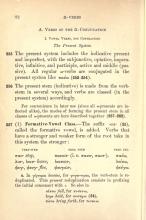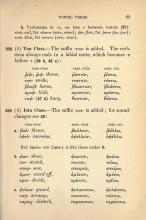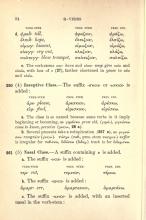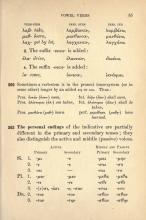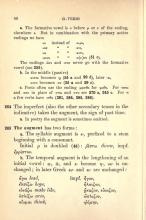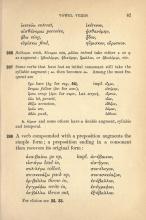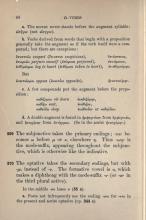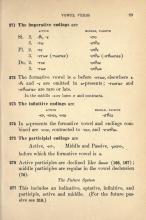255. The present system includes the indicative present and imperfect, with the subjunctive, optative, imperative, infinitive, and participle, active and middle (passive). All regular ω-verbs are conjugated in the present system like παύω (§§ 252 – 254).
256. The present stem (indicative) is made from the verb stem in several ways, and verbs are classed (in the present system) accordingly.
For convenience in later use (since all ω-presents are inflected alike), the modes of forming the present stem in all classes of ω-presents are here described together (§§ 257 – 262, below).
257. (1) Formative-Vowel Class. The suffix -ο:ε- (§ 25), called the formative vowel, is added. Verbs that have a stronger and weaker form of the root take in this system the stronger:
| Verb Stem | Pres. Stem | Pres. Ind. |
| παυ- stop |
παυο:ε- (i.e. παυο-, παυε-) |
παύω |
| λιπ-, λειπ- leave |
λειπο:ε- | λείπω |
| φυγ-, φευγ- flee |
φευγο:ε- | φεύγω |
a. In γίγνομαι (becοme), for γι-γεν-ο-μαι, the verb stem is reduplicated. This present reduplication consists in prefixing the initial consonant with ι.
πῑ́πτω (fall), for πι-πετ-ο
ἴσχω (hold) for σι-σεχ-ω (§ 54)
τίκτω (bring forth) for τι-τεκ-ω
b. Verb stems in -υ-, -ευ- lose υ between vowels (§ 27).
πλέω (sail) for πλευ-ω [πλυ-, πλευ-]
ῥέω (flow) for ῥευ-ω [ῥυ-, ῥευ-]
πνέω (blow) for πνευ-ω [πνυ-, πνευ-]
258. (2) Tau Class. The suffix -το:ε- is added. The verb stem always ends in a labial mute, which becomes π before τ (§§ 38.b, 43.a).
| Verb Stem | Pres. Stem | Pres. Ind. |
| ῥῑφ-, ῥιφ- throw |
ῥῑπτο:ε- | ῥῑ́πτω |
| τυπ- strike |
τυπτο:ε- | τύπτω |
| βλαβ- harm |
βλαπτο:ε- | βλάπτω |
| κρυφ- hide |
κρυπτο:ε- | κρύπτω |
| ταφ- (§ 47.d) bury |
θαπτο:ε- | θάπτω |
259. (3) Iota Class. The suffix -ιο:ε- is added; for sound changes see § 56.
a.
| Verb Stem | Pres. Stem | Pres. Ind. |
| βαλ- throw |
βαλλο:ε- | βάλλω |
| ὀφελ- increase |
ὀφελλο:ε- | ὀφέλλω |
But ὀφείλω (ὀφελ-, owe) is like those under § 259.b.
b.
| Verb Stem | Pres. Stem | Pres. Ind. |
| φαν- show |
φαινο:ε- | φαίνω |
| τεν- stretch |
τεινο:ε- | τείνω |
| σπερ- sow |
σπειρο:ε- | σπείρω |
| ἀμυν- ward οff |
ἀμῡνο:ε- | ἀμῡ́νω |
| κριν- decide |
κρῑνο:ε- | κρῑ́νω |
c.
| Verb Stem | Pres. Stem | Pres. Ind. |
| φυλακ- guard |
φυλασσο:ε- | φυλάσσω |
| ταγ- arrange |
τασσο:ε- | τάσσω |
| ταραχ- disturb |
ταρασσο:ε- | ταράσσω |
d.
| Verb Stem | Pres. Stem | Pres. Ind. |
| φραδ- tell |
φραζο:ε- | φράζω |
| ἐλπιδ- hope |
ἐλπιζο:ε- | ἐλπίζω |
| oἰμωγ- lament |
oἰμωζο:ε- | οἰμώζω |
| κλαγγ- cry οut |
κλαζο:ε- | κλάζω |
| σαλπιγγ- blow trumpet |
σαλπιζο:ε- | σαλπίζω |
e.The verb stems καυ- (burn) and κλαυ- (weep) give καίω and κλαίω, with loss of -υ- (§ 27), farther shortened in prose to κᾱ́ω and κλᾱ́ω.
260. (4) Inceptive Class. The suffix -σκο:ε- or ισκο:ε- is added.
| Verb Stem | Pres. Stem | Pres. Ind. |
| ἀρε- please |
ἀρεσκο:ε | ἀρέσκω |
| εὑρ- find |
εὑρισκο:ε | εὑρίσκω |
a. The class is so named because some verbs in it imply beginning or becoming.
γηρᾱ́σκω grow old (γηρᾱ-)
γιγνώσκω come to know, perceive (γνο:ω-, § 28.a)
b. Several presents take a reduplication (§ 257.a, above).
γι-γνώ-σκω recognize (γνο:ω-)
πάσχω (παθ-, pres. stem πασχο:ε-, suffer) is irregular for παθ-σκω; διδάσκω (διδαχ-, teach) is for διδαχ-κω.
261. (5) Nasal Class. A suffix containing ν is added.
a. The suffix -νο:ν- is added.
| Verb Stem | Pres. Stem | Pres. Ind. |
| τεμ- cut |
τεμνο:ε- | τέμνω |
b. The suffix -ανο:ε- is added.
| Verb Stem | Pres. Stem | Pres. Ind. |
| ἁμαρτ- err |
ἁμαρτανο:ε- | ἁμαρτάνω |
c. The suffix -ανο:ε- is added, wih an inserted nasal in the verb stem.
| Verb Stem | Pres. Stem | Pres. Ind. |
| λαβ- take |
λαμβανο:ε- | λαμβάνω |
| μαθ- learn |
μανθανο:ε- | μανθάνω |
| λαχ- get by lot |
λαγχανο:ε- | λαγχάνω |
d. The suffix -υνο:ε- is added.
| Verb Stem | Pres. Stem | Pres. Ind. |
| ἐλα- drive |
ἐλαυνο:ε- | ἐλαύνω |
e. The suffix -νεο:ε- is added.
262. Sometimes a verb stem is in the present tense system (or in some other) longer by an added ε:η or ο:ω.
| Present | Future | Perfect |
|
δοκέω (δοκε-) |
δόξω (δοκ-) shall seem |
|
| ἁλίσκομαι (ἁλ-) am taken |
ἁλώσομαι (ἁλω-) shall be taken |
|
| μανθάνω (μαθ-) learn |
μεμάθηκα (μαθη-) have learned |
263. The personal endings of the indicative are partially different in the primary and secondary tenses; they also distinguish the active and middle (passive) voices.
| Active | Middle and Passive | ||||
| Primary | Secondary | Primary | Secondary | ||
| Sing. | 1. | -μι | -ν | -μαι | -μην |
| 2. | -ς | -ς | -σαι | -σο | |
| 3. | -σι | — | -ται | -το | |
| Pl. | 1. | -μεν | -μεν | -μεθα | -μεθα |
| 2. | -τε | -τε | -σθε | -σθε | |
| 3. | -(ν)σι, -ᾶσι | -ν, -σαν | -νται | -ντο | |
| Dual | 2. | -τον | -τον | -σθον | -σθον |
| 3. | -τον | -την | -σθον | -σθην | |
a. The formative vowel is ο before μ or ν of the ending, elsewhere ε. But in combination with the primary active endings we have the following.
| -ω | instead of | -ο-μι |
| -εις | instead of | -ε-ς |
| -ει | instead of | -ε-σι |
| -ουσι | instead of | -ο(ν)σι (§ 51.c). |
The endings -ᾱσι and -σαν never go with the formative vowel (see § 355).
b. In the middle (passive)
-ε-σαι becomes -ῃ (§ 55.a and § 28.d), later -ει
-ε-σο becomes -ου (§ 55.a and § 29.c)
c. Poets often use the ending -μεσθα for -μεθα. For -αται and -ατο in place of -νται and
-ντο see 270.a (below) and 345.c. For -ς a few verbs have -σθα (§§ 381, 384 – 386).
264. The imperfect (also the other secondary tenses in the indicative) takes the augment, the sign of past time.
a. In poetry the augment is sometimes omitted.
265. The augment has two forms.
a. The syllabic augment is ε-, prefixed to a stem beginning with a consonant.
Initial ρ- is doubled (§ 48)
ῥῑ́πτω throw, impf. ἔρρῑπτον
b. The temporal augment is the lengthening of an initial vowel: α-, ᾱ-, and ε- become η-, ου- is unchanged; in later Greek ευ- and ει- are unchanged.
266. βούλομαι (wish), δύναμαι (can), and μέλλω (intend) take either ε- or η- as augment.
ἠβουλόμην, ἠδυνάμην, ἤμελλον, ἐβουλόμην, etc.
267. Some verbs that have lost an initial consonant still take the syllabic augment; εε- then becomes ει-. Among the most frequent are the following.
| Pres. | Impf. |
| ἔχω have (ἐχ- for σεχ-, § 54) |
εἶχον |
| ἕπομαι follow (ἑπ- for σεπ-) |
εἱπόμην |
| ἕρπω creep (ἑρπ- for σερπ-, Latin serpo) |
εἷρπον |
| ἐάω let, permit |
εἴων |
| ἐθίζω accustom |
εἴθιζον |
| ὁράω see |
ἑώρων |
| ὠθέω push |
ἐώθουν |
a. ἑώρων and some others have a double augment, syllabic and temporal.
268. A verb compounded with a preposition augments the simple form; a preposition ending in a consonant then recovers its original form.
| Pres. | Impf. |
| ἀνα-βαίνω go up |
ἀν-έβαινον |
| εἰσ-άγω lead in | εἰσ-ῆγον |
| συλ-λέγω collect |
συν-έλεγον |
| συ-σκευάζω pack up |
συν-εσκεύαζον |
| ἐμ-βάλλω throw in |
ἐν-έβαλλον |
| ἐγ-γράφω write in |
ἐν-έγραφον |
| ἐκ-βάλλω throw out |
ἐξ-έβαλλον |
For elision see §§ 32 and 33.
a. The accent never stands before the augment syllable.
εἰσῆγον (not εἴσηγον)
b. Verbs derived from words that begin with a preposition generally take the augment as if the verb itself were a compound; but there are exceptions.
| Pres. | Impf. |
| ὑποπτεύω suspect (ὕπ-οπτος suspicious) |
ὑπ-ώπτευον |
| ἐπιορκέω perjure oneself (ἐπίορκος perjured) |
ἐπι-ώρκουν |
| ἐνθῡμέομαι lay to heart (ἐνθμιος taken to heart) |
ἐν-εθῡμούμην |
But
| Pres. | Impf. |
| ἐναντιόομαι oppose (ἐναντίος opposite) |
ἠναντιούμην |
c. A few compounds put the augment before the preposition.
| Pres. | Impf. |
| καθέζομαι sit down |
ἐκαθεζόμην |
| καθίζω seat |
ἐκάθιζον |
| καθεύδω sleep |
ἐκάθευδον καθηῦδον |
d. A double augment is found in ἠμφεγνόουν from ἀμφιγνοέω, and ἠνειχόμην from ἀν-έχομαι. (So in the aorist ἠνεσχόμην.)
269. The subjunctive takes the primary endings; -ο:ε- becomes ω before μ or ν, elsewhere η. Thus -ω:η- is the mode-suffix, appearing throughout the subjunctive, which is otherwise like the indicative.
270. The optative takes the secondary endings, but with -μι instead of -ν. The formative vowel is ο, which makes a diphthong with the mode-suffix -ι- (or -ιε- in the third plural active).
In the middle -σο loses σ (§ 55.a).
a. Poets not infrequently use the ending -ατο for -ντο in the present and aorist optative (cp. § 344.c).
271. The imperative endings are as follows.
| Active | Middle, Passive | ||
| Sing. | 2. | -θι, -ς | -σο |
| 3. | -τω | -σθω | |
| Plur. | 2. | -τε | -σθε |
| 3. | -ντων (-τωσαν) | -σθων (-σθωσαν) | |
| Dual | 2. | -τον | -σθον |
| 3. | -των | -σθων | |
272. The formative vowel is ο before -ντων, elsewhere ε. -θι and -ς are omitted in -ω presents; -τωσαν and -σθωσαν are rare or late.
In the middle -ε-σο loses σ and contracts.
273. The infinitive endings are as follows.
274. In -ω presents the formative vowel and endings combined are -ε-εν, contracted to -ειν, and -ε-σθαι.
275. The participial endings are:
| Active | Middle, Passive |
| -ντ- | -μενο- |
before which the formative vowel is ο.
276. Active participles are declined like ᾱ̓́κων (§§ 166 and 167); middle participles are regular in the vowel declension (§ 76).

